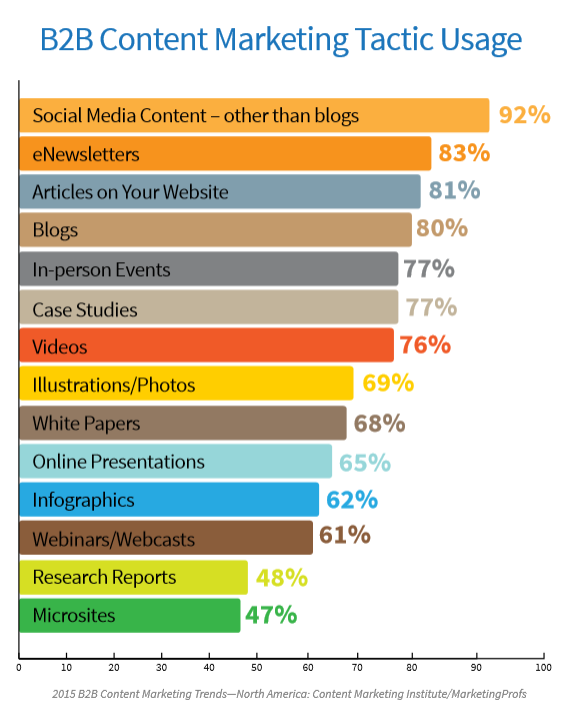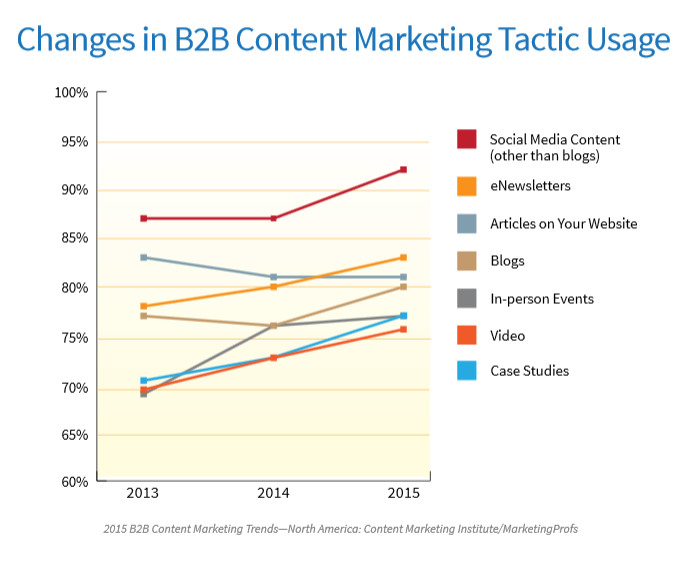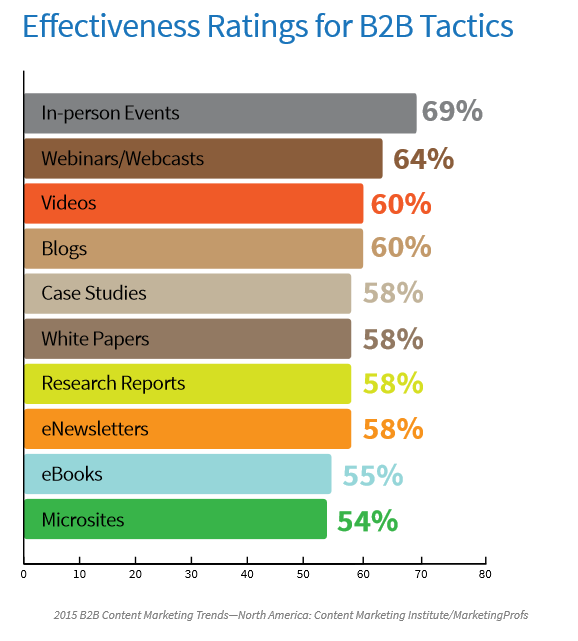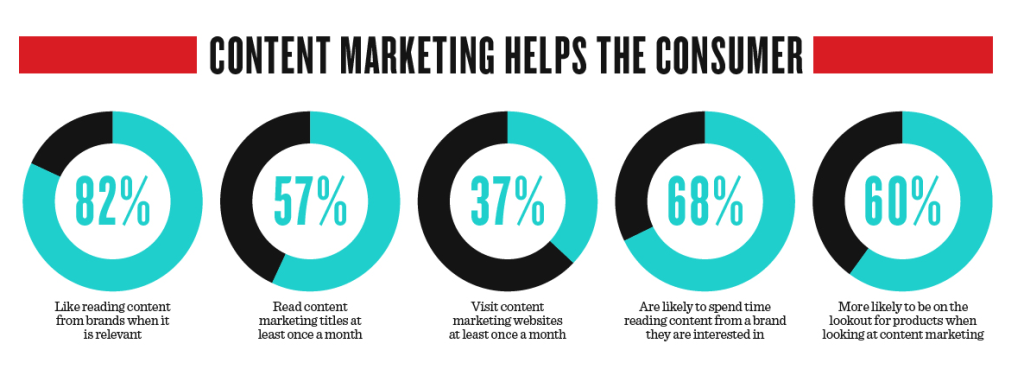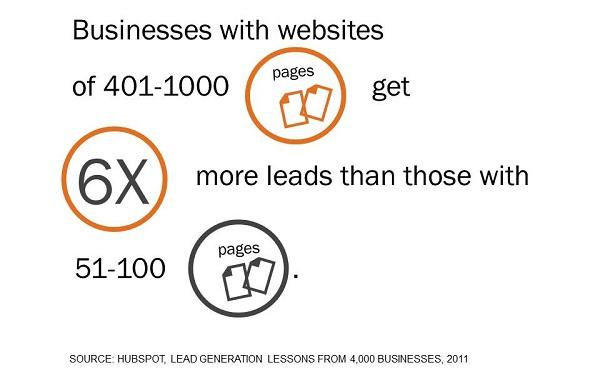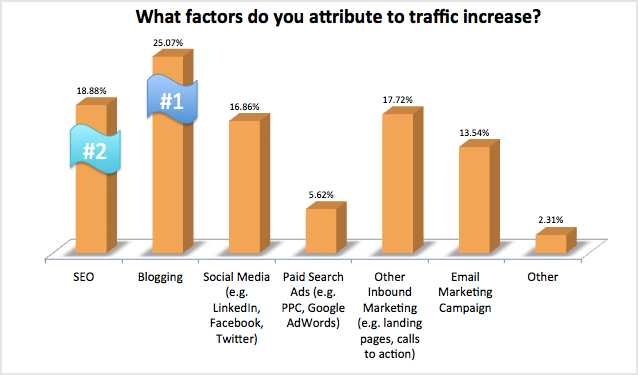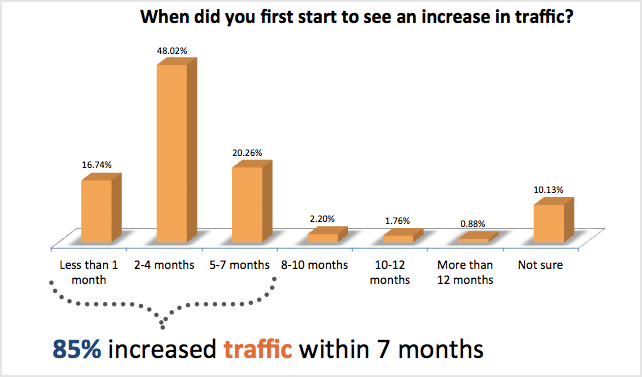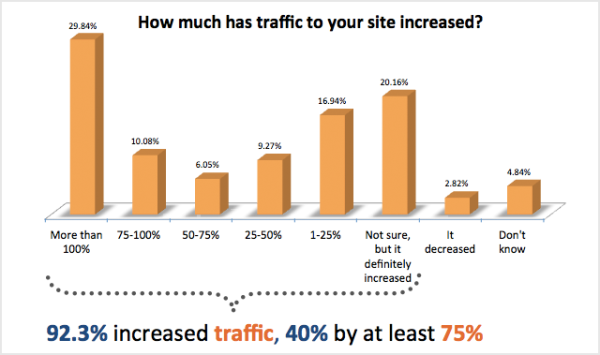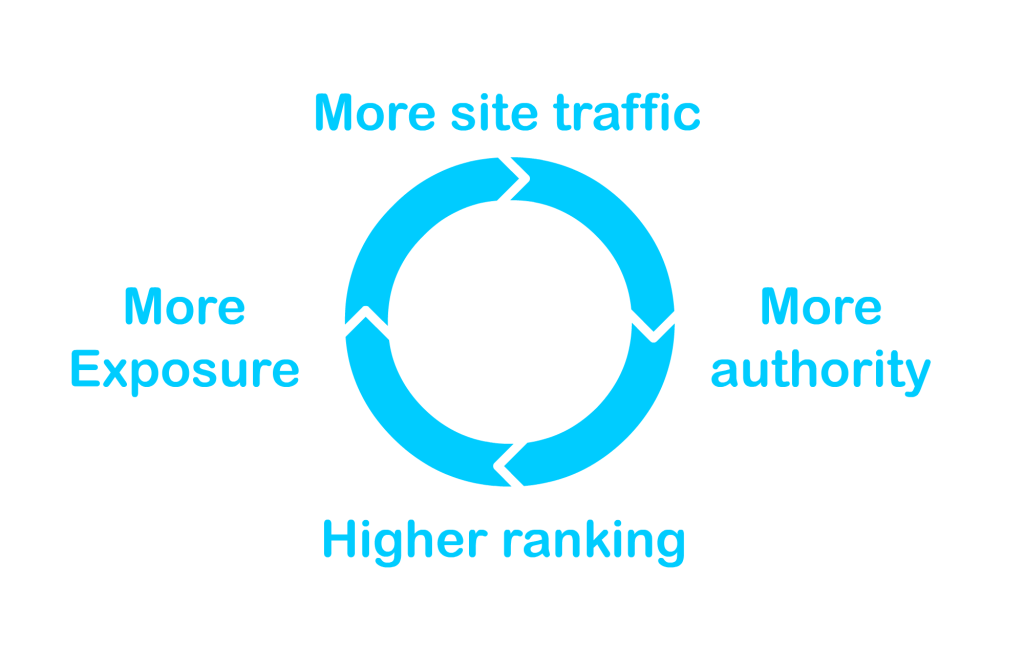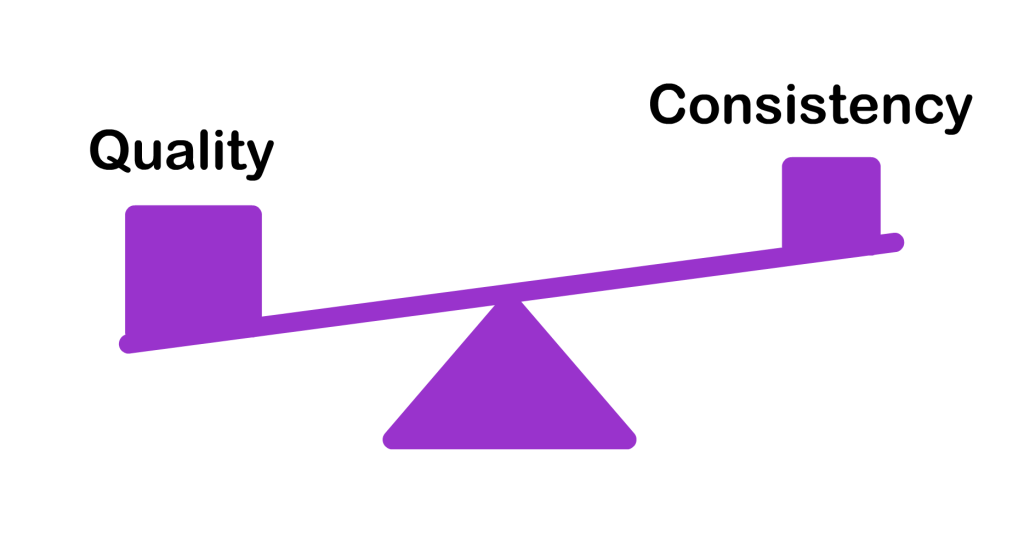What’s the point of having a blog?
After all, blogging takes a lot of time and effort. You have to worry about:
- Finding time for regular, consistent writing
- Undertaking detailed research
- Publicizing your blog posts and trying to expand your readership
Creating a consistently high quality blog can be a big drain on resources that could be used in other marketing efforts.
Yet in spite of this:
- 37% of marketers consider blogs to be the most valuable form of marketing
- 34% of Fortune 500 companies regularly update their blog
- 17% of marketers set the goal of increasing their blogging output during 2015.
Clearly, there’s something worth paying attention to when it comes to blogging. For so many marketers to rank blogging so highly, there’s probably at least some benefit to it.
But how much can a blog help your business? And why is blogging considered so effective?
Let’s have a look at what areas of online marketing a solid blog will improve, as well as why all companies – of any form – should prioritize their blog as one of their key content marketing platforms.
Some Basic Stats
Before we go too deeply into why blogging works for marketing online, let’s have a quick look at what effects blogging has on typical key performance indicators.
According to the Content Marketing Institute, blogs are used by 80% of B2B marketers, making them the fourth most common form of online marketing used by this group.
According to their data, blogs rank similarly to website articles and eNewsletters, which – unsurprisingly – often contain similar text content.
Overall, blogs have seen a slight increase in usage over the past few years, while posting articles directly onto websites have fallen in popularity.
In terms of impact, B2B marketers rank blogs as the most effective text-based content, with 60% of marketers considering blogs to be an effective technique for reaching audiences.
According to this data, blogs are on par with videos and are considered less effective than webinars and in-person events, though it’s worth noting that these alternative methods of marketing take a lot more time and resources to produce.
- For cost effectiveness, there’s no form of content as simple to produce as blog posts that works as effectively to grow a brand’s reach.
- While a skilled marketer will rely on a variety of content types and techniques, a good blog forms a healthy, effective backbone around which other types of content can be based.
Truly, there are very few marketing techniques that are as consistently popular as blogging.
While other tactics gain temporary popularity over short periods as new trends wax and wane, blogging is a tried and true technique for building a long term relationship with potential customers.
The Human Element: Building Online Trust and Authority
So what draws people to blogs? What makes blogging an effective marketing tool?
First, it’s important to remember that a very large proportion of internet users read blogs:
- Over 329 million people read at least one blog post online each month.
- The average person spends 23% of their time online reading either social media or blog content.
- 46% of internet users read blogs more than twice a day.
Secondly, with such a large potential audience, blogs are the perfect way to gain credibility and authority, all while improving customer relationships.
- One study found that 68% of blog readers are likely to read up on brands that they find interesting.
- The study also found that 60% of blog readers are likely to be actively looking for products when they are reading corporate blogs.
Beyond this, there are further benefits to your company’s authority:
- 81% of blog readers say that they trust the advice they read on professional blogs
- 61% of customers admit to having made a purchasing decision based on the advice they read on blogs.
From a human perspective, blogs are great: they build a brand’s authority and respect in the global online marketplace.
- Potential customers who come across your product as a result of reading blogs will be more likely to trust the marketing content that you produce.
- Blogs are rated as the 5th most trusted source of online information.
- This means that a blog is significantly more effective at raising brand authority than simply posting product details on a company website.
Further, there are lots of benefits to operating a blog that publishes high quality, informative content:
- 70% of consumers say that they feel closer to a company that produces quality content.
- 64% of people rank customer service as more important than price when making purchasing decisions.
- This means that a solid blog can make a big difference to online reputation and customer satisfaction.
Ultimately, a well-executed blog can reach a wide audience and can improve the level of authority and customer trust that your brand enjoys.
Good quality blog content will lead regular readers to naturally want to make purchases as their interest in your company grows.
Growing Site Traffic
The formula for website traffic is simple: the more people visit your site, the more sales you’ll make.
If your website is only getting a few unique visitors a day, there’s a relatively small chance any of them will make a purchase.
- On the other hand, if your traffic is high, more people reading your content increases your chances of making sales.
So the trick is to increase the number of eyeballs that are looking at your site, and this is one metric that blogging is really useful for.
Blogging to Increase Traffic
Companies with an active blog enjoy 97% more inbound links than companies without a blog.
- This is because, with more informative content, there’s a greater chance that other websites will use a company’s blog as a source of authority.
- It’s also because with good, high quality content that people want to read, a website appears more interesting than a site that’s only focused on delivering a marketing message.
Naturally, the more content your blog produces, the faster this will increase your site’s traffic.
- Websites with over 400 pages gain on average 6x more leads than sites with fewer pages.
This happens because, the more content there is on your website, the more visitors will be drawn to your site – either through search engines or through an increase in links from other websites.
- More content also gives site visitors more to engage with, leading to users spending more time on the site and increasing their likelihood of converting.
A blog is the perfect way to increase the amount of content on your website.
- Regular posting produces relevant content on a frequent basis, drawing in greater audiences.
- The site stays fresh from an SEO perspective, keeping your site at the top of search results.
- It also gives site visitors a reason to regularly visit your website, in order to enjoy the latest content.
- Further, you’ll see more links from other websites, as more content means more chances to produce something that the community surrounding your product will find appealing and useful.
All of these effects add together to produce a higher level of website traffic.
This is why:
- 82% of marketers who blog daily have gained a new customer through their blog
- Only 57% of monthly bloggers, on the other hand, have gained a new customer directly through their blogging efforts.
It’s no surprise, then, that blogging makes a big difference to website traffic:
- Brands that blog enjoy 55% more traffic than those which don’t.
- Posting over 15 blog posts per month (once every other day) leads to 5x more traffic than not blogging at all.
One Hubspot survey found that the number one factor for most marketers in generating an increase in traffic was blogging.
In fact, 85% of those beginning to use inbound marketing for the first time experienced an increase in traffic within 7 months, with nearly 50% of them seeing a vast growth in traffic in as little as 2-4 months.
What’s more, over 90% of marketers saw an increase in web traffic, with almost 30% seeing an increase of more than 100%!
The lesson here is simple: marketers looking to increase their website traffic should be blogging.
- If you’re not already blogging, now is the time to start.
- And if you are blogging, there’s a good chance that increasing your blog’s output will also increase the traffic to your website.
Producing high quality, regular blog posts with a high frequency will provide a very quick, very large boost to website traffic, which helps to bring more customers directly to your product.
Boosting SEO and Improving Rankings
Certainly, appearing higher in the Google search results can be very important to maximizing your business’s sales potential.
According to one report:
- 18% of organic traffic clicks on the first link in a search result.
- 10% of clicks go to the second link.
- 7% of traffic heads to the third link on a search results page.
The funny thing about search engine results is that in order to rank highly, your site benefits from already having a lot of traffic and authority.
The more authoritative your site, and the more it’s visited, the higher it ranks in search results. This leads conveniently to additional web traffic, boosting your site’s authority further.
Therefore, regularly posting a blog helps your website to rise in search rankings as a natural, organic side effect of producing more high quality content.
In addition to helping the number of inbound links and website traffic, blogs also provide an SEO boost in other ways:
- More content means a higher use of keywords that your customers may be searching for.
- Constant new content helps keep your site fresh and appear attractive to search engines.
- More pages make your site look more useful to potential searchers, helping its ranking.
Put simply: search engines are designed to find common blog attributes appealing. The more your blog produces high quality, useful content, the higher your website will rank in the search results.
Increasing Leads
Obviously, it’s important to improve website traffic stats.
But if potential customers are visiting your site briefly then leavin – never to return – your marketing efforts aren’t going to help generate long-term improvements in sales.
This is another area where blogging can help:
- A well-written, informative blog will keep visitors on your site for longer.
- It’ll also help them to increase their interest in your brand, helping to generate more leads.
The Numbers Don’t Lie
Again, when it comes to lead generation, there are plenty of statistics which show the effectiveness of blogging.
For instance, blogging generates 67% more leads on average for B2B companies.
For B2C marketing, blogging is even more effective:
- B2C companies who blog generate an average of 88% more leads every month, compared against companies who don’t blog.
There are plenty of reasons for this effectiveness at aiding in lead generation.
- As high quality blogs increase a company’s authority and respectability, site visitors will be more likely to trust a site and want to know more about the company behind it.
- A blog gives visitors more reason to stay on the website for longer, developing greater interest in the products the company offers.
- The more content a site visitor reads, the more likely they’ll be to respond to a call to action and engage with the company behind the blog content that they’re enjoying.
It’s important to not just tell a site visitor about a brand, but also to encourage them to:
- Engage with the company
- Learn more about the products on offer
- Provide their contact details
- Open up a dialogue about the products and services that they might be interested in.
Streamlining Conversions
Blog content is also useful because it provides consistent, helpful support throughout the conversion process.
Along the conversion process, users will run into a variety of different challenges that may stop them from progressing to the point of making a sale.
- Initially, potential customers may be apathetic towards a brand that they’re unfamiliar with.
- As time goes on, they may learn about the brand, but not see the personal relevance that would make the company’s services useful.
- Even after discovering what makes the product or service a perfect fit for them, they may have questions or concerns about how to use it, or how to get the most from their potential purchase.
All of these concerns can be addressed through an in-depth, high quality blog that anticipates customer needs.
It’s important to make sure that customers have all the guidance and support they require to make an informed purchasing decision.
- 55% of customers have said that ease of access to information is a crucial element in their choosing to make a purchase.
- 86% of those polled have said that they’d happily spend up to 25% more in order to gain a positive customer experience.
As blogs provide site visitors with all the information and resources they need throughout the sales process, they increase the likelihood that the customers will choose to follow through on calls to action.
Providing Support to Maximize Sales
A good blog relies on producing a lot of different content with different subject matter: after all, the purpose of a blog is to regularly publish articles that aim to cover the broadest possible range of interests that are relevant to your company’s brand.
This means that different articles can touch on subjects that affect all aspects of the conversion process, including:
- Articles about a brand’s general field help to draw in potential leads
- More in-depth guides to the products and services that are offered help to overcome potential customer concerns that would stop progression
- Regular calls to action ensure that the maximum number of site visitors take actions that lead them to sales.
Nurturing leads to help customers progress towards conversion has been proven to have a powerful effect on sales:
- One study found that nurturing leads by providing relevant information and support meant a 20% increase in sales.
- Another study found that customers make 47% larger orders when they are supported throughout the conversion process.
- This means that giving customers relevant and helpful information can increase both the number of sales, and the amount that each customer orders.
As many customers will use a company’s website to thoroughly explore the brand, products and services before making a purchasing decision, the blog is the perfect way to answering potential customer questions before they even think to ask them.
- This helps to maximize leads and encourage greater sales levels.
- Blog articles can even continue supporting customer needs after purchase, helping them to get the most from their products.
- This also helps to ensure that they’ll come back to make repeat purchases in the future.
With a well-written, informative blog, it’s easy not just to reach out to new potential customers and draw them to your website, but also to keep them progressing towards their eventual decision to purchase your products.
The Number One Rule
Hopefully, by now, if you weren’t already sold on the importance of a good blog for content marketing purposes, you’ll now see why it’s so crucial to get your blog going.
In closing, though, let’s take a second to look at the most important element of your blog that will ensure its success:
Consistent quality.
A blog is only useful if it provides information and resources that are useful, organized clearly, and beneficial to your intended customers.
- Creating blog posts that do nothing more than sing the praises of your products won’t get anyone’s attention.
- Failing to maintain high quality levels throughout all of your blog posts will mean that visitors will get frustrated, bored or will otherwise become disinterested with your services.
There’s more to it than just putting out a few good posts, though:
- Long breaks in between posts damage the likelihood that readers will return
- The best gains in traffic and leads come from regular consistent posting.
It’s important to balance the quality of blog posts with regular consistency.
This isn’t always easy to do:
- High quality posts take longer to produce, meaning that it can be difficult to produce them rapidly
- Working too hard to meet an aggressive update schedule can lead to errors, mistakes and other dips in quality for your blog articles.
It’s difficult to say where the line should be drawn for any blog – it’s likely going to be different based on each individual company’s situation.
The key thing is to make sure that a blog produces the highest quality articles on a regular basis, ensuring that articles will be helpful and informative while also adding regularly to the archive of blog articles.
The Power of Blogging
Creating a blog that consistently and regularly provides meaningful, interesting and useful resources to your customers is a fantastic way of driving organic traffic towards your site.
- An engaging blog will naturally draw in traffic as visitors turn to your site as a voice of authority.
- As your site grows, it will build its search engine friendliness.
- Potential leads will trust your brand thanks to your quality blog, and will use the resources within your articles to make decisions about purchasing your products and services.
There really are very few marketing tools as effective as a blog. It’s no wonder that 79% of companies who blog report receiving a solid return on their investment.
So, what are you waiting for?
Whether you’re an expert blogger or a relative newbie, there’s no time like the present to make headway with your articles.
Get out there and blog!
Does your company currently maintain an active blog? If so, what kinds of benefits have you seen from doing so? Share your experiences by leaving a comment below:
Images: Pixabay, Pixabay, Content Marketing Institute, Pixabay, The CMA, Wikipedia, Hubspot, Hubspot, Flickr, Pixabay, Pixabay, Pixabay, Flickr, Pixabay.





